What Does D-Day, World War II, (and now this war on the Corona 19 Virus) Mean To Us Today?
(Reflections From Normandy)
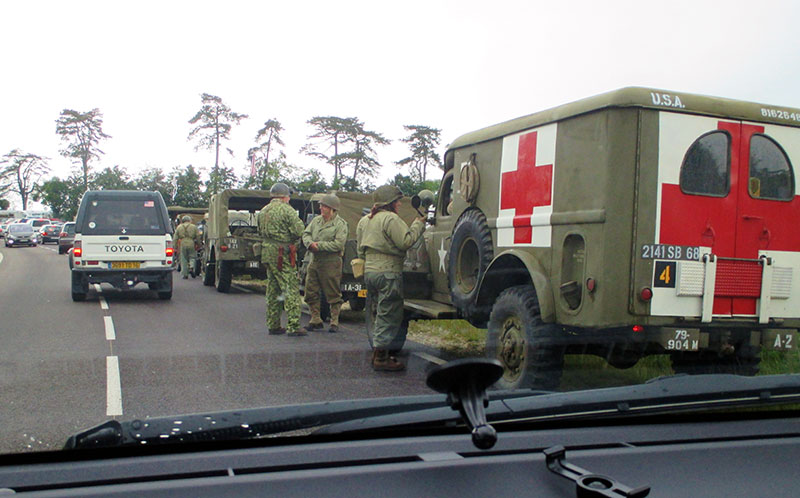
June 6, 2014, Normandy, France
You would think it is D-Day all over again! It is just as sobering and just as exciting.
The 70th anniversary. Why not wait to have this giant celebration on its 75th? As a docent at one of the many Normandy museums dedicated to the landings told me, “Eet eez because we would not know eef zer would be many more veterans zat could come over heeer by zat time”.
From military parades chock full of 1940’s vehicles and equipment, to parachute jumps using the same type used during the war, all of Normandy is once again bathed in olive drab. It is at once celebratory and somber. In between the tears for those who were sacrificed, and the chills surrounding the honoring, is a deep overriding sense of admiration, appreciation, and awe - awe that something so huge could be pulled off so well. A great human spring, coiled and tense for so many months, had finally been released. As Stalin, incompetent leader as he was, stated, “The large-scale forcing of the English Channel and the mass landing of troops of allies in Northern France have fully succeeded. One must admit that the history of wars does not know any such undertaking so broad in conception, so grandiose in its scale, and so masterly in its execution”.
On Omaha Beach especially the battle belonged that morning to the thin wet line of khaki that dragged itself ashore. Plodding through cold surf and their own vomit, they attacked a well-entrenched foe, weapons useless or missing, armed with nothing but courage. They were riding into hell. Their mission? To crack Hitler’s vaunted “Atlantic Wall,” reputed to be impenetrable, along the northern coast of France. Nazi Germany had held a tight grip on the Continent ever since France fell in June 1940, and the British Expeditionary Force subsequently was pushed into the English Channel at the French port of Dunkirk. It was June 6, 1944, and it was payback time.
In their briefings and rehearsals the troops had been assured that the Air Corp and ships would blow gaps in the minefields and beach obstacles, turn the pillboxes and casemates into dust, and annihilate the defenders who were thought to be only low-grade troops unfit for duty on more active fronts.
The bombers, flying above low overcast, had released their bombs too far inland, causing casualties only among Norman cows. The Navy, fearful of hitting the disembarking infantry, also overshot the target. Underwater demolition experts had gone in early to blow gaps in the obstacles and mark safe paths to the beach, but most of them were either dead, wounded, or had lost all their specialized equipment in the rough surf. Most of the amphibious Sherman tanks, which were supposed to have reached shore before the infantry had sunk, carrying their crewmen to their deaths. Even specially fitted landing craft carrying an arsenal of rockets close to shore missed everything. There was not so much as a single bomb crater on the beach in which to hide, and the German gunners were all alert and zeroed in on every landing site. At Omaha Beach especially, the largest and most carefully planned invasion in the history of warfare was on the verge of disaster. To the astonishment of many, and the joy of the planners, they carried the day.
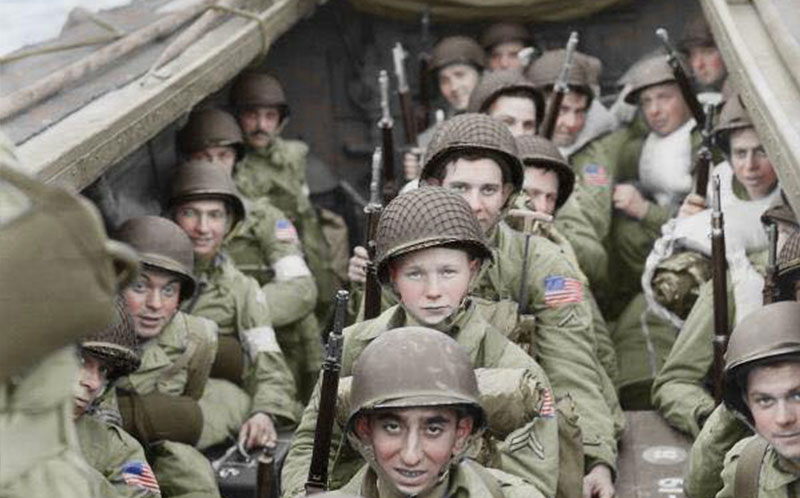
The predominant national contributor in materiel and uniforms, if not men, (83,000 British and Canadian versus 73,000 American, with naval back up of 53,000 American and 113,000 British) was the United States, but the attackers who stormed those beaches, and the pilots and paratroopers who paved the way, were made up of Americans, Brits, Canadians, Poles, the French, who were finally getting the chance to return to their home country after escaping at Dunkirk, Greeks, Belgians, Dutchmen, Norwegians, Australians and New Zealanders. They all fought through a sickening claustrophobic nightmare to win the day. Pilots from Poland and Czechoslovakia are credited with helping win the battle of Britain, and the Poles were the first to steal and break into the enigma machine.
As one of the speakers to a large group of international students, I had a backstage pass, and spent fifteen days covering the length of Normandy into Brittany. From Cherbourg to Chartres, Deauville to Benerville, Caen to Carentan, Bayeux to every one of the landing beaches, Juno, Sword, Utah, Gold and Omaha, Argentan to Avranche, and St. Lo to St. Malo. I later, in fact, followed a friend’s Father’s footsteps from his second day landing at Omaha Beach, through the horror of the hedgerows to Mortain, traced the Falaise Pocket, marched his route through Paris, hiked the absolute place of hell called the Heurtgen Forest, the ‘Bulge’ towns of Malmedy, Bastogne, and St. Vith in Belgium, then to Aachen and Stolberg in Germany. I followed him almost all the way to the Rhine River's Remagen Bridge upon which a shell burst fired by the Germans in an attempt to destroy the bridge before more Allied soldiers could cross it injured him and sent him home.
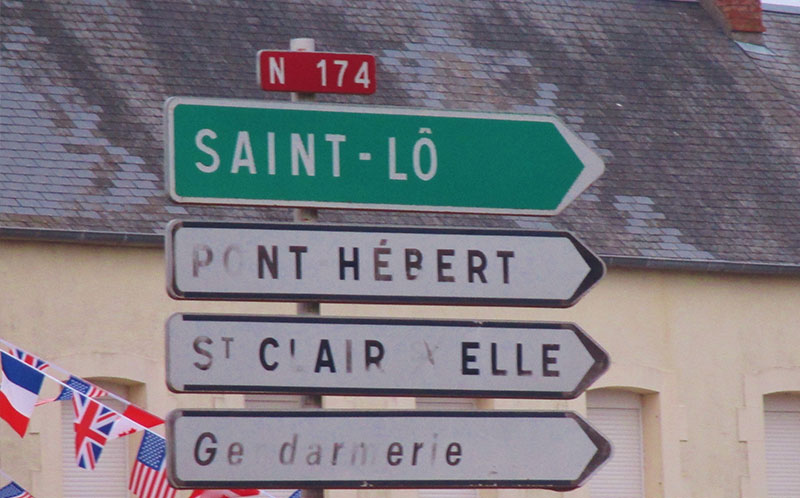
A lady who lived in the famous parachute landing site around St. Mere Eglise brought me to tears with her comments about her memory as a young farm girl and other citizens helping to bury the American dead. She said in her wonderfully heavy French accent, “You know, when you Americans came, we knew you ware coming, we had heard ze rumors. We deed not know you would come down into our back yarrrdd; you scared my chickens. But, when you move away the Germans? When you push away ze Boche? I helped my motherrr, and ze ozerr townspeople, we would burry your dead. And zat ees when the relationship with America started; zat is when the connection began. Because when we put your boys into ze ground, zay became our boys: when we put your sons into ze ground zey become our sons, and we feel it to zis day." I didn't know tears didn't have to hit an eyelid as mine came cascading out upon hearing her relate that.
Another fellow stunned me with the importance of our taking a participative role today. I was walking down the street in downtown Avranche, a Norman French city that George Patton and his Third Army Group had liberated (they have a Sherman tank and a bust of him in their town square as a commemoration to him), when a guy walking in my direction stopped me and asked. “Etre vous American?” When I said, oui, he pumped my hand in a handshake and said, Oh, Monsiur, merci, merci pour tout ce que vous les Américains ont fait”. Thank-you, thank-you for all that you Americans did.
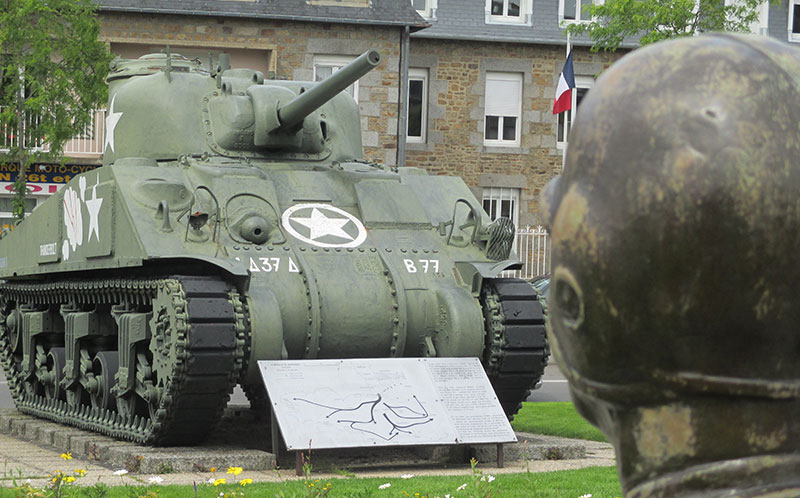
Me, you, he was thanking you and I for what those soldiers who hit the beaches, and for all the support and planners did.
Don’t you see? And of course you see. That is our lesson. We still have to take an active role in making this a global community, to stop narcissistic tyranny like the Putins, the Dutartes, the Mugabe’s (who else can you think of) in their tracks.
Houses all over Normandy are festooned with American, British, Australian and French flags. There are huge flags at the top of the Cathedral in Bayeux (home of the famous tapestry), banners even adorn the side of the towering Mont St. Michelle. The people I am staying with had come from farming stock in the area of Cherbourg. One of the great pities was to hear the mother's sadness at the time as a young girl having their cows and livestock killed or maimed having stepped on German mines. At the must-see D-Day museum in Caen, while watching a movie about the Utah and Omaha Beach battles, as well as the Pointe du Hoc cliff scaling, we were interrupted by a group of school kids romping, laughing, and making noise. My first reaction was anger. How could they be so disrespectful in such a sacred place? But then that was the reason we fought that war, so they could romp and laugh and make noise. The realization made me want to go romp with them.
You have heard of American Civil War or Revolutionary War re-enactors, right? Well there are several thousand WW2 re-enactors here. I mean it, thousands. Every one of them is authentically dressed in soldier’s fatigues, right down to the correct insignias. Did I say soldiers? Nurses are here. Townspeople are dressed in their nineteen forties-style French clothing, clothing that their parents wore, the actual dresses, trousers, and jackets dug out of old storage trunks for this occasion. There are hundreds of Sherman tanks, jeeps, halftracks, tents, foxholes, machine guns and cannon. Several large camps have been set up complete with the famed “Arizona Bar”.
There is not a shadow of a doubt that war could not have been won if America hadn’t entered it and aimed its industrial might, its organizational ability, and its citizens’ blood into the fray. And the reenactors? They are American, Danish, French, Swiss, Polish, Belgian, Czech, Norwegian, name it. But the majority do not have English as their mother tongue. That stunned me all the more. Here were people looking like my countrymen, and they weren’t! Then came this revelation. I was told to remember that Americans made up forty percent of the landing forces, sixty percent were from everywhere else. They had been provided uniforms by the United States, so it always looks like it is only Americans storming those beaches. All of them were paying homage to their actual relatives who’d attacked those same beaches - the warriors of our collective "greatest generation". Now, with this, the seventy-fifth anniversary of the end of World War 2, we need to reflect what it means to us today.
We must all understand and understand deeply, that the soul of a people may be likened to the keyboard of a great church organ: heavenly music may flow out of it, or the man at the keyboard may actually be a demon, an inept, bigoted, narcissistic con man as was Hitler. However, when society is heavily influenced by its civic, social, and charitable groups and organizations, democracy’s precarious but still hopeful position is preserved, and its music becomes a metaphor for an extraordinary capacity to marshal its collective good for the benefit of its citizenry. By staying engaged in civic activities, the theme of my talk, you help define the basis for harmony among the mosaic of cultures that make up our country, all of our countries, which in turn helps define the common interests and goals of mankind.
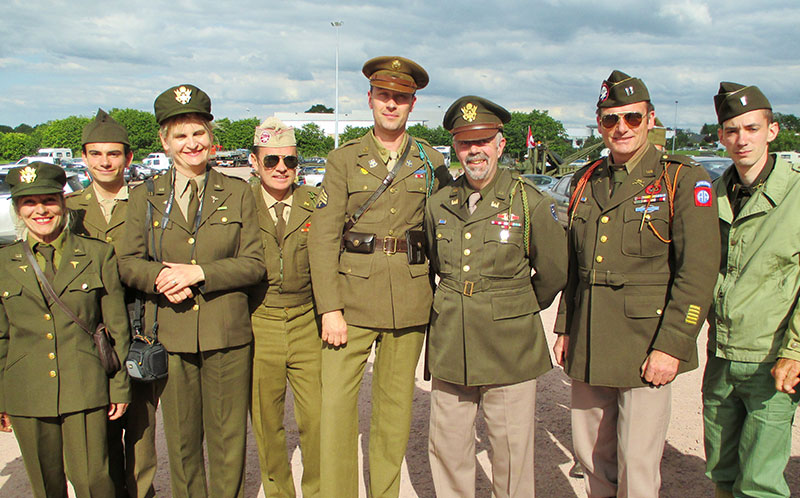
For younger people; taking ownership of your employer’s vision, acting as if you were the owner of the company is a sure road to success: And you, leaders - being the model. By picking up the skills to guide and mold leadership in others on a transformational basis rather than a transactional one gives you the right to call yourself a leader. Both of these coupled with consistent civic participation and civic achievement, brings you to the honor of truly being called a Good Citizen. You are doing exactly what the dying Tom Hanks character asked Private Ryan in the movie “Saving Private Ryan” to do when he said, “James, earn this; earn it”.
When this pandemic is over we will want to reevaluate our participation in society by again joining, supporting, and staying involved in various charitable or social-improvement organizations. Whether it be the Boys and Girls Clubs to the Boy and Girl Scouts, the Soroptimists or the Elks, the OddFellows, the Lions, Kiwanis, the Masons, Rotary, from local Chambers of Commerce to Downtown Preservation Societies, you earn it by becoming a member. From attending charitable events but more importantly helping to make those events happen you strengthen and perpetuate the values that underlie political and social discourse versus focusing on differences: which only lends deeper meaning to our membership in those organizations doesn't it? You earn it.
Isolationists delayed our entry into WWII to the point where it was almost too late. In later years Ronald Regan said, “We’ve learned that isolationism never will be again an acceptable response to tyrannical governments.” Once committed, the Normandy invasion and subsequent push across France, Belgium, and Germany to aid in the liberation of Europe was the US’s finest hour. That said, our finest hours are not behind us! Political brinkmanship and division is currently causing us much pain. Addiction to smartphone use, computer games, and wide screen home entertainment versus finding ways to work well with each other is of much concern to social scientists.
This Coronavirus war requires from us the same discipline, the same heeding of respected authorities, the same sacrifice for the betterment of the nation. We are not collecting pots and pans and tires and copper from various families, but we are wanting to collect their same resolve. We will get through this. One visit to Normandy and it becomes crystal clear why, once the virus is inoculated, civic engagement, participation, and volunteerism is so important: those people died on those beaches so that we would have the opportunity to join anything. We pay those soldiers back, we pay our health care workers and first responders back, by serving, by paying rent for our space on earth.
Tyranny lurks whenever we get complacent about the search for accurate knowledge and scientific fact.
Revolution lurks when egos begin to hate their own funerals, where the less competent or easily corrupted are allowed to influence or lead our governmental departments, where investor greed versus universal good becomes our overriding interest, or wherever we let human rights and humanitarianism, thus our humanity, get trampled.
For us to remain a democracy and deserve the name; for all the wars we have been involved in to make sense; we too must uphold the values of our Founding Fathers who formed the United States as a bulwark against the unbridled power of church, dictator, oligarch, potentate or plutocrat. To govern an electorate yearning for “law and order” at whatever price was a goal of Hitler’s. So we vote for only those politicians who practice and adhere to a code of civil, civic, servancy. The key word being ‘civil’, the second, being of service. Would we vote for anyone else?
It all comes down to two victory-sustaining words: Vote and Volunteer! Make sure every Millennial-aged person you know gets into the habit of doing both. As Leon Gautier, leader and survivor of the French troops who on D-Day stormed ashore to free his home of Ouistreham said in 2018, “It is time now for a whole new generation to be vigilant.” And WWII Supreme Commander Ike Eisenhower had you in mind as well when he said to the pre-invasion force “The hopes and prayers of liberty-loving people everywhere march with you”.
By Mac Macdonald for Military Magazine
